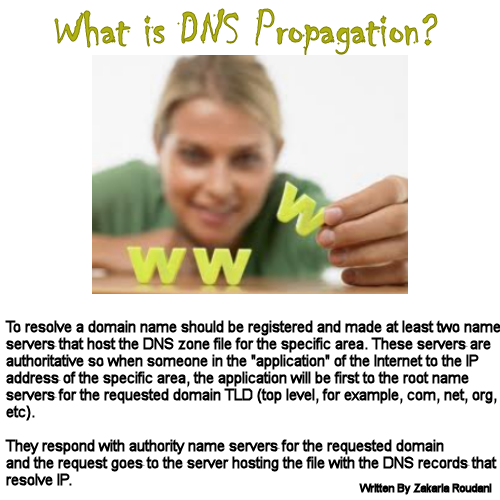To resolve a domain name should be registered and made at least two name servers that host the DNS zone file for the specific area dns propagation . These servers are authoritative so when someone in the "application" of the Internet to the IP address of the specific area, the application will be first to the root name servers for the requested domain TLD (top level, for example, com, net, org, etc) dns propagation . They respond with authority name servers for the requested domain and the request goes to the server hosting the file with the DNS records that resolve IP.
Each ISP manages its own DNS server storage cache / dns propagation . These DNS servers records stored in its local cache to store the voting servers network traffic authoritative name every time they receive a request for a given domain dns propagation . So when you ask your domain name in their browser, the request is sent to the server name of your ISP. The IP address of your domain's authoritative name servers is resolved and the file is stored in the local memory of the ISP name server.
The record remains stored in memory local name server with the settings applied to the DNS zone file, and in particular dns propagation , the TTL parameter in the SOA (Start of Authority) record. This value is set by default to 14,400 seconds (4 hours) in the BIND nameserver. Often, this value increases to a day or two, again due to the economy for dns propagation traffic.
So when your local name server caches a record of your DNS zone file, holds the record in your memory as long as specified in the TTL parameter its zone file dns propagation . When you make a new application for the same record before the TTL time passes, your ISP name server will respond with the appropriate register, instead of re-interview an authoritative name server and will do so far reaches a lifetime. After reaching life will return dns propagation to your DNS zone from the authoritative name server for the domain and begin using the updated records.
That's why you have to wait until one day dns propagation , when you make changes in the DNS zone.
While waiting for an updated record of spreading dns propagation , it's a good idea to remove the system of local DNS resolution on the PC, because the DNS records can be cached there too. Check out the following links for more information about how to delete DNS cache instructions



No comments:
Post a Comment